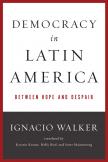Populism and Poverty
University of Notre Dame Press. 280p $38
When things go wrong in Latin America, the tendency is to write new laws or a new constitution. But new laws rarely remedy the situation because Latin America’s major problems are rooted in deep historical realities that condition attitudes and practices, which in turn undermine the democratic process. In this well-researched and up-to-date study, Ignacio Walker explains to the reader in clear language why democracy has had so much difficulty taking hold from Mexico to Chile. Although democracy seems to be well and alive today, except in Cuba, the author argues that it is far from being deeply rooted in the region.
Walker, a leading Christian Democrat in Chile and a former member of the Vicariate of Solidarity, a Catholic human rights organization, offers a panoramic view of Latin America’s battle for democracy from independence up to the current neo-liberal and populist regimes. He argues that Latin American politics are still influenced by the oligarchic mentality that the postcolonial elites imposed upon society. This is not a new theme. In the 1960s and 70s, when military regimes swept across the continent, many authors pointed to the authoritarian tradition in Latin America. Others observed that even Mexico under the Institutional Revolutionary Party, though it was not a military dictatorship, was in fact a perfect example of this authoritarian and paternalistic tradition. Although there were elections, in reality the P.R.I. controlled the process and excluded all opposition forces.
Walker’s most interesting observations concern the neoliberals and the neopopulists. The neoliberals came to power in the wake of the last cycle of dictators (although some of the dictators, like Pinochet, enthusiastically promoted neoliberalism). They privatized bloated state companies and encouraged outside investments. But they also left the poor without jobs or safety nets.
Neopopulism arose precisely as a response to this Darwinian liberalism. The late Hugo Chávez in Venezuela, Rafael Correa in Ecuador, Evo Morales in Bolivia and to some extent the Kirchners (Néstor and Cristiana Fernández) in Argentina, took up the cause of the “people,” nationalized some companies and excoriated North American “imperialism.” Although they raised the banner of “21st socialism,” and made pilgrimages to Havana, none have gone so far as to actually implant a Cuban-style regime in their respective countries.
But as Walker argues, neither the liberals nor the populists have advanced the cause of democracy. The neoliberals empowered the wealthy and excluded the poor. The populists gave rise to charismatic leaders who centralized all power in their own hands, but to the detriment of democratic institutions. But not all socialists have been irresponsible. Ricardo Lagos and Michelle Bachelet in Chile, and “Lula” in Brazil, were, in fact, quite moderate and avoided the type of demagogic populism that Chávez practiced.
Although democracy in Latin America has made some progress, it still suffers from weak democratic institutions. The judiciary in some countries cowers before the whims of overbearing executives, and in other countries it is simply corrupt. The author borrows a phrase from Fareed Zakaria to underline the fact that although there are elections, by and large the democracies in Latin America are “illiberal.” “Illiberal” in this case does not refer to economic liberalism, but to the absence of a tradition of the loyal opposition. To be more precise, ordinary people do not trust their own governments. Political opposition groups do not dialogue. People do not trust fellow citizens. The culture of civic responsibility is weak. People obey traffic laws only when the police are present.
As the subtitle of the book indicates, Latin America is caught “between hope and despair.” There is hope because democracy is here to stay. There is despair because democracy in Latin America does seem to be at times, as Winston Churchill famously declared, the worst form of government, except, of course, for all the others. Walker’s study on the state of democracy in Latin America is brilliant, well argued and convincing. It is a must read for political scientists, sociologists, U.S. government officials and nongovernmental organization workers “on the ground” who want to understand how things work in Latin America.
This article also appeared in print, under the headline “Populism and Poverty,” in the May 20, 2013, issue.








